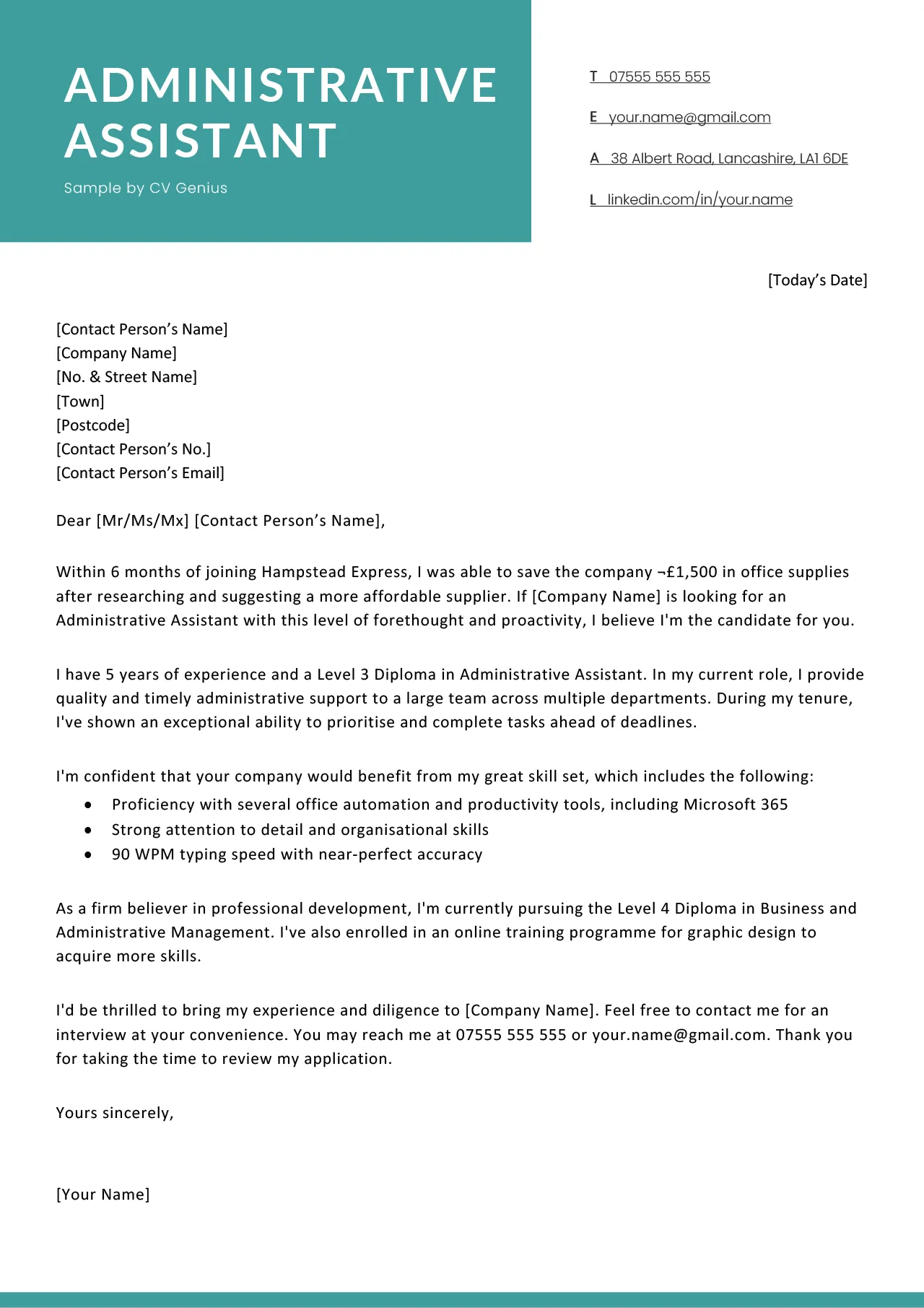Understanding the Administration Cover Letter
A well-crafted cover letter is a crucial tool in your job search arsenal, especially when applying for administrative positions. It serves as your introduction to a potential employer, providing a snapshot of your qualifications, skills, and personality. This guide offers a comprehensive cover letter example for administration, breaking down each element and providing actionable tips to help you create a compelling document that gets you noticed. The administration field demands a diverse skill set including strong organizational skills, communication proficiency, and the ability to handle multiple tasks efficiently. Your cover letter is your chance to highlight these abilities and show why you are the best candidate for the role. This detailed guide will walk you through the process step-by-step.
What is an Administration Cover Letter?
An administration cover letter is a formal document that accompanies your resume when applying for administrative positions. It provides a narrative to your professional story, allowing you to explain why you are a perfect match for the job. Unlike your resume, which lists your qualifications, the cover letter lets you showcase your personality, enthusiasm, and how your skills align with the specific needs of the role and the company culture. The administration field often requires strong interpersonal skills and a proactive approach, which can be effectively demonstrated in a well-written cover letter. This means to use concise and active language, that is tailored to each job application.
Purpose of the Cover Letter
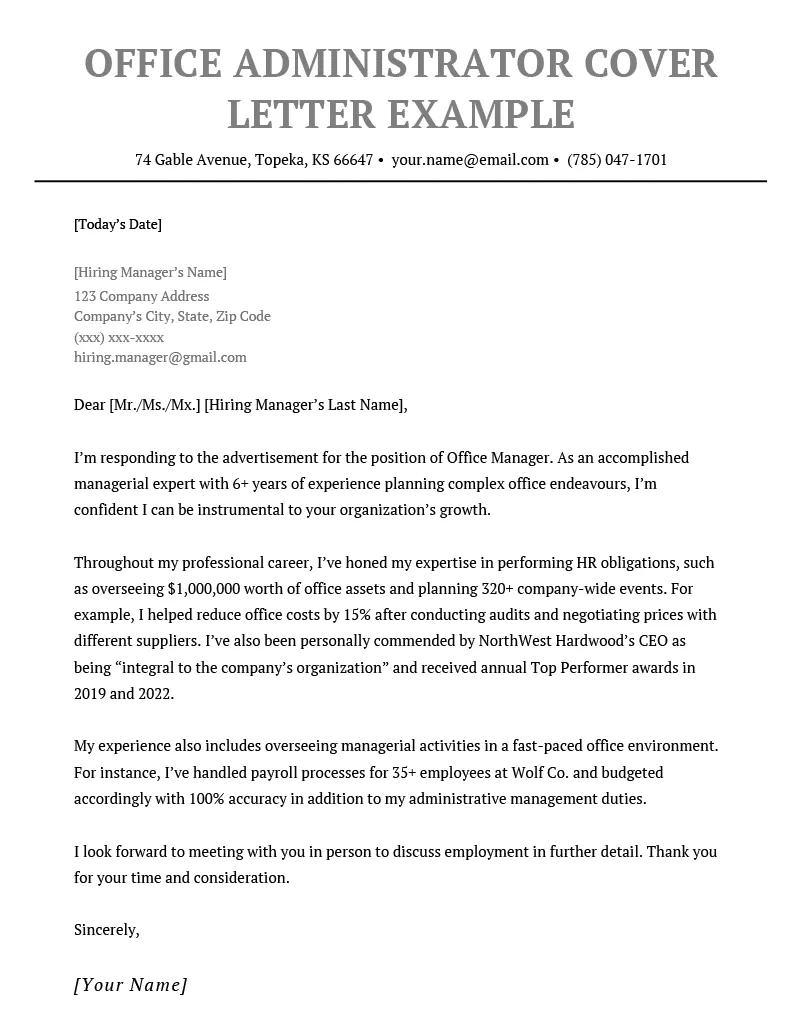
The primary purpose of an administration cover letter is to persuade the hiring manager to review your resume and ultimately invite you for an interview. It’s your opportunity to make a strong first impression by highlighting your most relevant skills and experiences in a way that resonates with the job description. Beyond simply listing your qualifications, the cover letter allows you to elaborate on your achievements and explain how you can contribute to the organization’s success. It also provides a chance to express your genuine interest in the role and the company, which can set you apart from other candidates. The cover letter also demonstrates your written communication skills, a critical ability in most administrative roles.
Key Components of an Administration Cover Letter
A well-structured administration cover letter typically includes several key components. Each section plays a vital role in presenting you as a qualified and enthusiastic candidate. From the header to the closing paragraph, every element should be carefully crafted to convey professionalism and a clear understanding of the job requirements. A strong cover letter can significantly increase your chances of landing an interview and ultimately securing the administrative position you desire. This structured approach ensures your letter is easy to read and highlights your qualifications effectively.
Header and Contact Information
Start with your header, which should include your full name, address, phone number, and professional email address. Ensure the contact information is up-to-date and easy to find. Directly below your contact information, include the date, followed by the hiring manager’s name (if known), their title, and the company’s address. Using the hiring manager’s name adds a personal touch and shows you’ve done your research. If you can’t find the name, use a general salutation such as “Dear Hiring Manager.”
Salutation
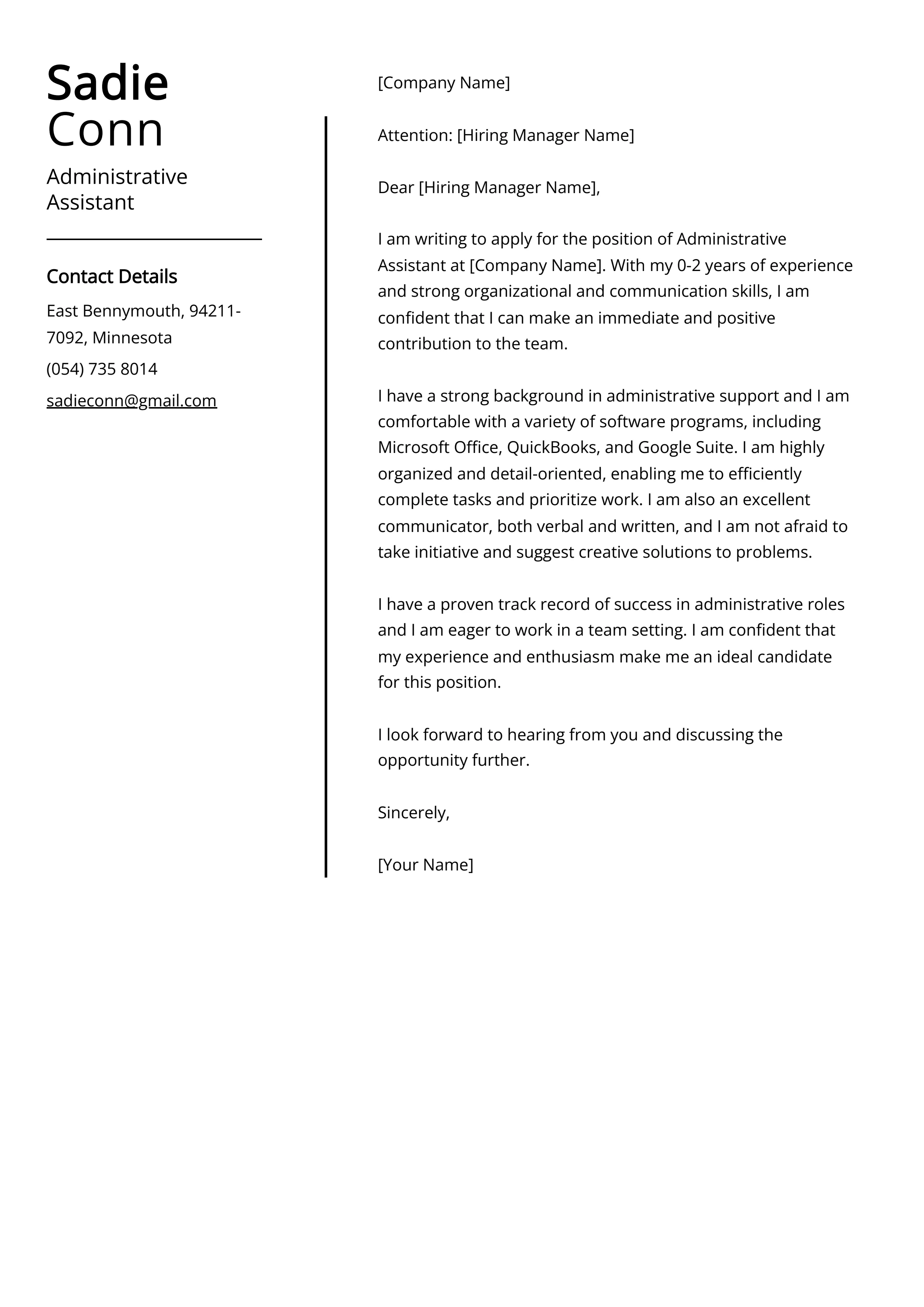
The salutation sets the tone for your letter. Aim to use a professional salutation like “Dear Mr./Ms./Mx. [Last Name]”. If you do not know the hiring manager’s name, use “Dear Hiring Manager” or “Dear [Department Name] Team”. Avoid overly casual greetings. Ensure that you spell the name correctly; this shows your attention to detail.
Opening Paragraph
The opening paragraph is your hook. State the position you are applying for and where you found the job posting. Briefly mention why you are interested in the role and the company. Express your enthusiasm and highlight one or two key skills or experiences that make you a strong candidate. Keep it concise and engaging, aiming to capture the reader’s attention immediately.
Body Paragraphs
The body paragraphs are where you showcase your qualifications and experience in more detail. Use these paragraphs to explain how your skills and achievements align with the job requirements. Provide specific examples of your accomplishments, quantifying them whenever possible (e.g., “Managed a team of five, resulting in a 15% increase in efficiency”). Tailor your examples to the specific needs of the role and the company. Use keywords from the job description to demonstrate you understand the position’s requirements.
Highlighting Relevant Skills and Experience
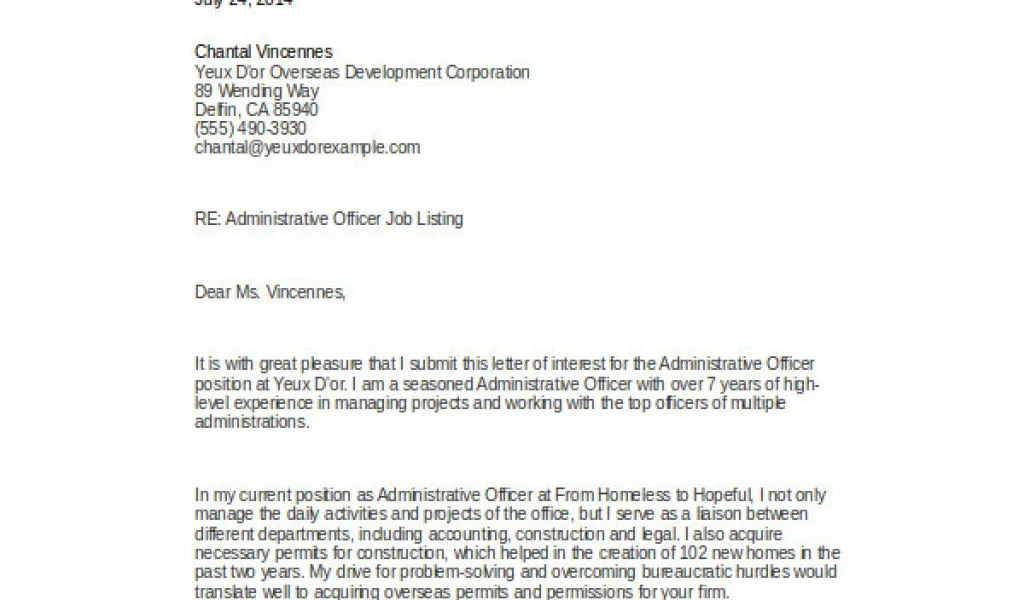
Focus on the skills and experiences that are most relevant to the job. Administrative positions often require strong organizational skills, excellent communication abilities, proficiency in relevant software, and the ability to multitask. Mention specific instances where you have demonstrated these skills. For example, if the job description requires experience with scheduling, describe a time you successfully managed complex schedules or coordinated meetings involving multiple stakeholders. Your goal is to make a clear connection between your abilities and the job requirements.
Quantifying Achievements
Whenever possible, quantify your achievements to demonstrate your impact. Instead of saying “Improved office efficiency,” say “Implemented a new filing system that reduced document retrieval time by 20%.” Use numbers, percentages, and specific data to show the results of your actions. This provides concrete evidence of your abilities and makes your accomplishments more compelling. Quantifying your achievements makes it easier for the hiring manager to understand the value you can bring to the role.
Closing Paragraph and Call to Action
In the closing paragraph, reiterate your interest in the position and the company. Express your enthusiasm for the opportunity and summarize your key qualifications. End with a clear call to action, such as “I am eager to discuss how my skills and experience can contribute to [Company Name]’s success. Thank you for your time and consideration. I look forward to hearing from you soon.” Ensure the closing is professional and courteous, and thank the hiring manager for their time. Proofread your letter one last time to remove any errors before sending.
Formatting and Presentation
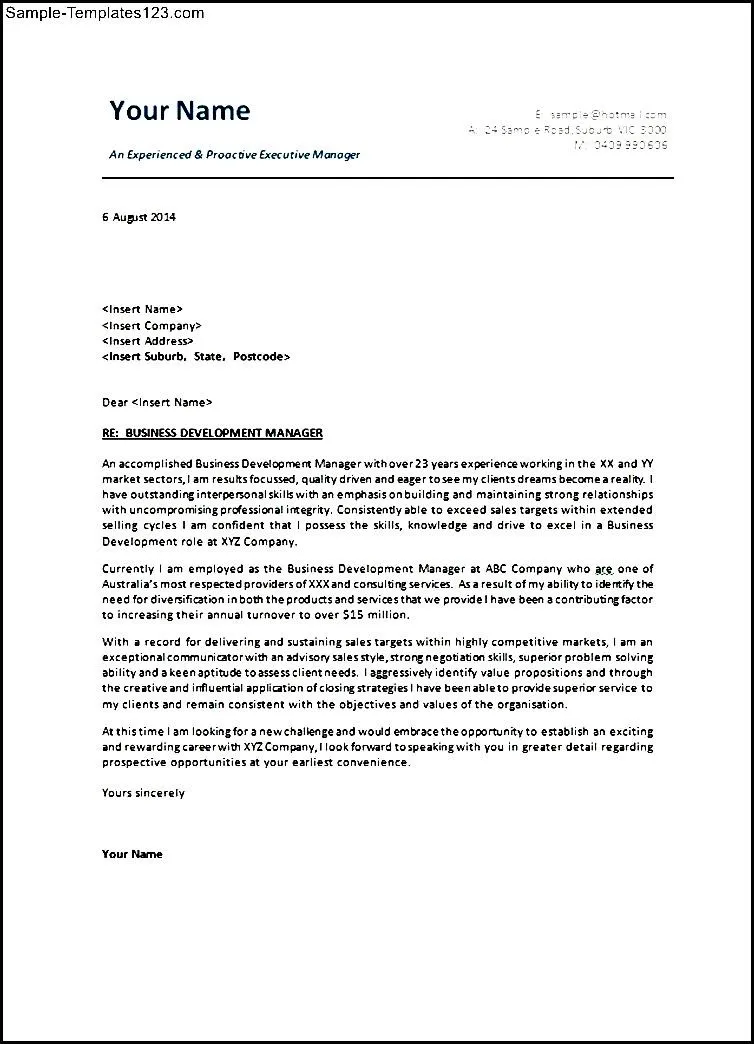
The formatting and presentation of your cover letter are just as important as the content. A well-formatted letter is easy to read and demonstrates your attention to detail, a crucial attribute for administrative roles. Choosing the right font, using white space effectively, and carefully proofreading your document can significantly improve your chances of making a positive impression. Your cover letter should be visually appealing and professional. A clean, organized layout makes your letter more accessible and helps the hiring manager focus on your qualifications.
Choosing the Right Font and Font Size
Select a professional and readable font such as Times New Roman, Arial, or Calibri. The font size should be between 10 and 12 points. Ensure the font is consistent throughout the document. Avoid using overly decorative or unusual fonts, as they can be distracting and make your letter appear unprofessional. A clear, legible font contributes to a positive first impression and makes it easier for the hiring manager to read your letter.
Using White Space Effectively
Use white space to improve readability. Leave ample margins (typically one inch on all sides) and double-space between paragraphs. Avoid overcrowding your letter with text. White space helps break up the text, making it easier for the reader to scan the document and focus on key information. It also gives your letter a clean and professional appearance.
Proofreading and Editing
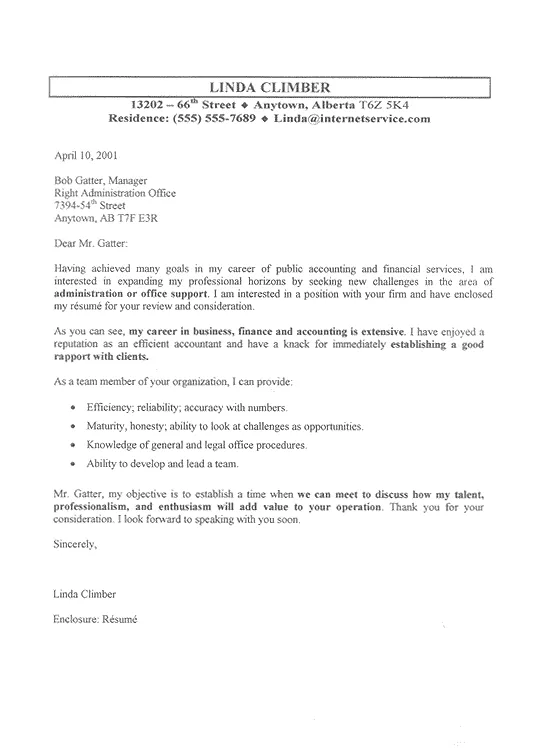
Proofread your cover letter meticulously for any typos, grammatical errors, or inconsistencies. Use a spell-checker and grammar-checker, but also read your letter carefully, as these tools may not catch all errors. Ask a friend or family member to proofread your letter as well. A polished, error-free cover letter demonstrates your attention to detail and professionalism, which are essential qualities for administrative roles.
Tailoring Your Cover Letter for Each Job
Generic cover letters are a major turn-off for hiring managers. Tailoring your cover letter to each job application is essential to demonstrate your genuine interest and show that you understand the specific requirements of the role. Researching the company and customizing your letter will greatly increase your chances of making a positive impression and getting an interview. This level of effort reflects your professionalism and your commitment to the application process.
Researching the Company and the Role
Before writing your cover letter, research the company and the specific role you are applying for. Visit the company’s website to learn about their mission, values, and recent projects. Review the job description carefully to understand the key responsibilities and required skills. This research will allow you to tailor your letter to the company’s needs and demonstrate that you have a clear understanding of the position and how you can contribute to the company’s goals.
Customizing Your Letter to Match the Job Description
Use the job description as a guide to customize your cover letter. Highlight the skills and experiences that are most relevant to the position, and use keywords from the job description to demonstrate that you understand the requirements. Provide specific examples of how you have demonstrated these skills in the past. Tailoring your letter shows that you have taken the time to understand the role and are genuinely interested in the opportunity.
Common Mistakes to Avoid
Avoiding common mistakes can significantly improve your cover letter’s impact. These errors can undermine your credibility and decrease your chances of being selected for an interview. Taking the time to review your cover letter and avoid these pitfalls will greatly enhance your chances of success in your job search. Pay close attention to these details and ensure your cover letter is as strong as possible.
Generic Letters
Avoid sending generic cover letters that could be used for any job. Tailor your letter to each specific role and company. Generic letters demonstrate a lack of effort and interest. Show that you have researched the company and understand the role by customizing your letter to highlight your relevant skills and experiences.
Typos and Grammatical Errors
Typos and grammatical errors can make your letter appear unprofessional and demonstrate a lack of attention to detail. Proofread your cover letter carefully for any errors, and ask a friend or family member to review it as well. Ensure your writing is clear, concise, and free of errors. This is crucial for demonstrating professionalism and attention to detail.
Exaggerating or Lying About Qualifications
Never exaggerate or lie about your qualifications or experience. Dishonesty can damage your credibility and lead to serious consequences if discovered. Be honest and accurate in your representation of your skills and achievements. Focus on highlighting your genuine qualifications and the value you can bring to the role.
Examples of Strong Administration Cover Letters
Reviewing examples of strong administration cover letters can provide valuable insights into how to effectively showcase your skills and experience. These examples demonstrate the key elements discussed earlier, such as highlighting relevant skills, quantifying achievements, and tailoring the letter to the specific job requirements. Use these examples as inspiration to craft your own compelling cover letter.
Example 1 Highlighting Organizational Skills
In this example, the applicant highlights their organizational skills by detailing their experience managing schedules, coordinating meetings, and maintaining office records. They provide specific examples of their achievements, such as implementing a new filing system that improved efficiency. The focus is on demonstrating the applicant’s ability to streamline office processes and manage administrative tasks effectively.
Example 2 Showcasing Communication Abilities
This example showcases an applicant’s communication abilities by highlighting their experience in composing professional correspondence, interacting with clients, and managing phone calls. The applicant describes specific instances where they successfully resolved customer inquiries and handled sensitive information with discretion. The focus is on demonstrating the applicant’s ability to communicate effectively and build positive relationships.
Example 3 Demonstrating Problem-Solving Skills
Here, the applicant emphasizes their problem-solving skills by providing examples of how they have addressed challenges in previous administrative roles. They describe instances where they identified and resolved issues, such as improving office workflows or implementing cost-saving measures. The focus is on demonstrating the applicant’s ability to think critically, find solutions, and improve operational efficiency.
In conclusion, a well-crafted cover letter is a critical tool for securing an administration position. By understanding the key components, following best practices, and tailoring your letter to each job, you can significantly increase your chances of landing an interview. Remember to showcase your skills, quantify your achievements, and express your enthusiasm for the role and the company. With these tips, you’ll be well on your way to creating a cover letter that gets you noticed and helps you achieve your career goals. Good luck with your job search!
